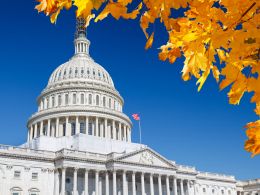
Why the United States Election System Must Adopt Blockchain Technology (Op-Ed)
Talking about the election with my family and friends, many reflect a complacent and, frankly, spoiled attitude about the manner in which things are done in the U.S. Many either don’t know or don’t care that the national election can be easily manipulated, at least in certain key counties, which hold the capacity to influence states, which further hold the ability to influence elections. This op-ed article will look to expand on the good, the bad, and the ugly of the recent 2016 U.S. presidential election, and how, regardless of who you supported, changes to the working system need to be....
Related News
“I haven't yet seen a blockchain system that I would trust with a county-fair jellybean count, much less a presidential election.” While certain parties in the United States continue to challenge the integrity of the election process, a group of researchers is advocating against using Internet-based and blockchain-based voting systems in the future.According to a Nov. 16 report from researchers at the Massachusetts Institute of Technology’s Computer Science and Artificial Intelligence Laboratory, relying on blockchain voting technology is not a reliable means of promoting greater turnout....
The stress related to the United States Presidential election has triggered a wave of FOMO buying in Bitcoin, picking up in steam even more the longer the outcome of the election lingers on. With more than 48 hours already passed since polls began to close, how long could this go on for, and how will […]
It is not the first time Ukraine gets involved with distributed ledger technology provided by the (Ethereum) blockchain. There are many different use cases for the blockchain outside of the realm of finance, and slowly but surely, people see the benefits of this technology. In Ukraine, the next series of elections might make use of the Ethereum Blockchain. Such an electronic election system is quite a novelty in the world of voting, and it can be utilized for different types of elections in the future. One thing election processes lack is transparency, as well as real-time results. Even....
As unprecedented charges of rigging have loomed over the U.S. presidential election, much attention has focused on the capability of blockchain technology to make voting more transparent. Joseph Lubin, the founder of ConsenSys and the co-founder of Ethereum, observed in an article in Futurism that decentralizing technologies have important implications for not only improving elections, but in empowering individuals overall. In addition to charges of rigging, this year’s U.S. election featured the emergence of foreign and non-state actors wielding the power to influence the election’s....
With a new bipartisan bill by the House of Representatives, a call has been issued to the US Government to adopt a national policy to promote citizens’ access to new financial innovation including blockchain and digital currencies. A new Congressional resolution is calling on the United States government to support the development and ease of access to financial tools including blockchain, digital currencies and FinTech. The resolution seeks a national policy for technology in order to achieve those goals. The bipartisan bill resolution sees its title as “Expressing the sense of the House....





